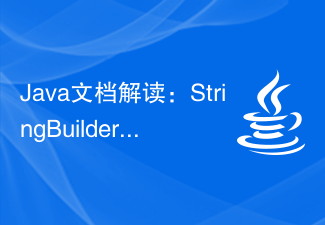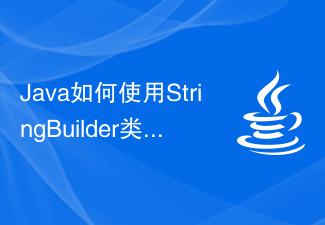 Java
Java javaTutorial
javaTutorial Detailed introduction to StringBuilder no longer needed to splice strings in Java 8
Detailed introduction to StringBuilder no longer needed to splice strings in Java 8Among Java developers, String concatenation takes up a lot of resources and is often a hot topic.
Let us discuss in depth why it takes up so many resources.
In Java, a string object is immutable, meaning that once it is created, you cannot change it. So when we concatenate strings, a new string is created, and the old one is marked by the garbage collector.

If we process millions of strings, then we will generate millions of additional strings to be processed by the garbage collector.
The bottom layer of the virtual machine performs many operations when splicing strings. The most direct dot operator for concatenating strings is the String#concat(String) operation.
public String concat(String str) {
int otherLen = str.length();
if (otherLen == 0) {
return this;
}
int len = value.length;
char buf[] = Arrays.copyOf(value, len + otherLen);
str.getChars(buf, len);
return new String(buf, true);
}public static char[] copyOf(char[] original, int newLength) {
char[] copy = new char[newLength];
System.arraycopy(original, 0, copy, 0,
Math.min(original.length, newLength));
return copy;
}void getChars(char dst[], int dstBegin) {
System.arraycopy(value, 0, dst, dstBegin, value.length);
}You can see that a character array is created, and the length is the sum of the length of the existing characters and the spliced characters. Their values are then copied into a new character array. Finally, create a String object from this character array and return it.
So these operations are numerous. If you calculate it, you will find that the complexity is O(n^2).
To solve this problem, we use the StringBuilder class. It's like mutable String class. The splicing method helps us avoid unnecessary duplication. It has a complexity of O(n), which is far better than O(n^2).
However, Java 8 uses StringBuilder to concatenate strings by default.
Documentation description of Java 8:
In order to improve the performance of string concatenation, the Java compiler can use the StringBuffer class or similar technology. When the value expression is used, the creation of intermediate String objects is reduced.
The Java compiler handles this situation:
public class StringConcatenateDemo {
public static void main(String[] args) {
String str = "Hello ";
str += "world";
}
}The above code will be compiled into the following bytecode:
public class StringConcatenateDemo {
public StringConcatenateDemo();
Code:
0: aload_0
1: invokespecial #1 // Method java/lang/Object."<init>":()V
4: return
public static void main(java.lang.String[]);
Code:
0: ldc #2 // String Hello
2: astore_1
3: new #3 // class java/lang/StringBuilder
6: dup
7: invokespecial #4 // Method java/lang/StringBuilder."<init>":()V
10: aload_1
11: invokevirtual #5 // Method java/lang/StringBuilder.append:(Ljava/lang/String;)Ljava/lang/StringBuilder;
14: ldc #6 // String world
16: invokevirtual #5 // Method java/lang/StringBuilder.append:(Ljava/lang/String;)Ljava/lang/StringBuilder;
19: invokevirtual #7 // Method java/lang/StringBuilder.toString:()Ljava/lang/String;
22: astore_1
23: return
}You can use these bytecodes As seen in, StringBuilder is used. So we no longer need to use StringBuilder class in Java 8.
The above is the detailed content of Detailed introduction to StringBuilder no longer needed to splice strings in Java 8. For more information, please follow other related articles on the PHP Chinese website!
 Java 8中如何计算一年前或一年后的日期?Apr 26, 2023 am 09:22 AM
Java 8中如何计算一年前或一年后的日期?Apr 26, 2023 am 09:22 AMJava8计算一年前或一年后的日期利用minus()方法计算一年前的日期packagecom.shxt.demo02;importjava.time.LocalDate;importjava.time.temporal.ChronoUnit;publicclassDemo09{publicstaticvoidmain(String[]args){LocalDatetoday=LocalDate.now();LocalDatepreviousYear=today.minus(1,ChronoUni
 Go语言怎么拼接字符串Jan 12, 2023 pm 04:25 PM
Go语言怎么拼接字符串Jan 12, 2023 pm 04:25 PM拼接字符串的方法:1、使用“+”号拼接,语法“str = str1 + str2”;2、利用fmt包的sprintf()函数拼接,语法“str = fmt.Sprintf("%s%d%s", s1, i, s2)”;3、使用join函数拼接;4、利用buffer包的WriteString()函数拼接;5、利用buffer包的Builder()函数拼接。
 在Java中将字符串转换为StringBuilderSep 02, 2023 pm 03:57 PM
在Java中将字符串转换为StringBuilderSep 02, 2023 pm 03:57 PMStringBuilder类的append()方法接受String值并将其添加到当前对象。将字符串值转换为StringBuilder对象-获取字符串值。附加使用append()方法将字符串获取到StringBuilder。示例在下面的Java程序中,我们是将字符串数组转换为单个StringBuilder对象。 实时演示publicclassStringToStringBuilder{ publicstaticvoidmain(Stringargs[]){&a
 stringbuilder清空的方法有哪些Oct 12, 2023 pm 04:57 PM
stringbuilder清空的方法有哪些Oct 12, 2023 pm 04:57 PMstringbuilder清空的方法有:1、使用setLength(0)方法清空StringBuilder对象;2、使用delete(0, length)方法清空StringBuilder对象;3、使用replace(0, length, "")方法清空StringBuilder对象;4、使用new StringBuilder()重新创建一个新的StringBuilder对象。
 使用java的StringBuilder.replace()函数替换指定范围的字符Jul 24, 2023 pm 06:12 PM
使用java的StringBuilder.replace()函数替换指定范围的字符Jul 24, 2023 pm 06:12 PM使用java的StringBuilder.replace()函数替换指定范围的字符在Java中,StringBuilder类提供了replace()方法,可以用来替换字符串中指定范围的字符。该方法的语法如下:publicStringBuilderreplace(intstart,intend,Stringstr)上面的方法用于替换从索引star
 Java中使用StringBuilder类的delete()方法删除字符串中的部分内容Jul 26, 2023 pm 08:43 PM
Java中使用StringBuilder类的delete()方法删除字符串中的部分内容Jul 26, 2023 pm 08:43 PMJava中使用StringBuilder类的delete()方法删除字符串中的部分内容String类是Java中常用的字符串处理类,它具有很多常用的方法可用于字符串的操作。然而,在某些情况下,我们需要对字符串进行频繁的修改,而String类的不可变性会导致频繁的创建新的字符串对象,从而影响性能。为了解决这个问题,Java提供了StringBuilder类,它
 Java文档解读:StringBuilder类的substring()方法详细介绍Nov 03, 2023 pm 04:31 PM
Java文档解读:StringBuilder类的substring()方法详细介绍Nov 03, 2023 pm 04:31 PMJava文档解读:StringBuilder类的substring()方法详细介绍引言:在Java编程中,字符串的处理是非常常见的操作之一。而Java提供了一系列关于字符串处理的类和方法,其中StringBuilder类是常用于频繁字符串操作的选择。在StringBuilder类中,substring()方法是一个非常有用的方法,用于截取字符串的子串。本文将
 Java如何使用StringBuilder类的substring()函数截取字符串的子串Jul 24, 2023 pm 12:13 PM
Java如何使用StringBuilder类的substring()函数截取字符串的子串Jul 24, 2023 pm 12:13 PMJava如何使用StringBuilder类的substring()函数截取字符串的子串在Java中,我们经常需要处理字符串的操作。而Java的StringBuilder类提供了一系列的方法,方便我们对字符串进行操作。其中,substring()函数可以用于截取字符串的子串。substring()函数有两种重载形式,分别是substring(intstar


Hot AI Tools

Undresser.AI Undress
AI-powered app for creating realistic nude photos

AI Clothes Remover
Online AI tool for removing clothes from photos.

Undress AI Tool
Undress images for free

Clothoff.io
AI clothes remover

AI Hentai Generator
Generate AI Hentai for free.

Hot Article

Hot Tools

Atom editor mac version download
The most popular open source editor

mPDF
mPDF is a PHP library that can generate PDF files from UTF-8 encoded HTML. The original author, Ian Back, wrote mPDF to output PDF files "on the fly" from his website and handle different languages. It is slower than original scripts like HTML2FPDF and produces larger files when using Unicode fonts, but supports CSS styles etc. and has a lot of enhancements. Supports almost all languages, including RTL (Arabic and Hebrew) and CJK (Chinese, Japanese and Korean). Supports nested block-level elements (such as P, DIV),

SublimeText3 Linux new version
SublimeText3 Linux latest version

VSCode Windows 64-bit Download
A free and powerful IDE editor launched by Microsoft

ZendStudio 13.5.1 Mac
Powerful PHP integrated development environment





